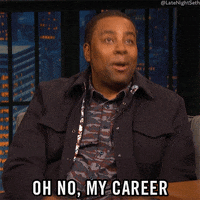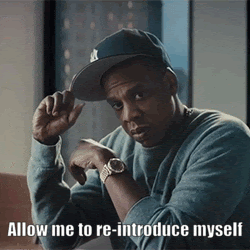Hi all,
I’m alive and well, and apologies for the 2 month hiatus from the newsletter! I entered a busy period in my day job, and tbh, once I started getting distracted by that, I just kept letting the newsletter slip week to week…
But, the busy season is nearing an end and I’ve stockpiled a bunch of ideas and conversations for the newsletter - I suppose the nice thing about writing about careers, doubts, questions and decisions, is that there is never any shortage of material:
Since it’s been a hot second, here’s a quick reminder of what this newsletter aims to do:
A weekly (ahem.. ish) post of ideas and thoughts on career decisions, attitudes, challenges and solutions that have emerged from my own experiences and conversations with my colleagues, friends and broader professional network
A (hopefully) lighthearted read that also catalyzes some insights and personal reflections as you read. There aren’t many things as profoundly and universally shared as thinking about careers and our identities surrounding them - why don’t we chat and laugh about it all over a large, heavily caffeinated beverage?
And here’s a quick reminder of the newsletter’s author: Me AKA the “Woo” of The To-Woo List, and why I write on this topic in my little corner of the internet:
I spend a lot of time thinking and reading about career satisfaction. We really do spend SO. MUCH. of our time working, and thinking about work. It imprints onto our identities, relationships and emotions. I believe it’s possible to like our jobs most of the time and find positions that are largely aligned with our values, whatever they happen to be (yes I know that sounds a bit woo-woo, but if that belief isn’t just a tiny bit true, then guys wth are we doing with this lifetime??!!)
While I strongly believe in career happiness and a bit in the woo-woo’ness…, I’d like to think I’m pretty pragmatic about obtaining career happiness. We may want to make millions of dollars just “pursuing our passion”… but nobody is paying me millions (or ones) to make snarky commentary about reality television, or to recreationally jog, or to do crosswords. There are real tradeoffs we make in every stage of career, so I hope you find amidst the woo-woo, a healthy dose of realism and tough love in these newsletters as well
And finally, what gives me the right to opine on careers, (besides y’know..being a human with a job)? I’m a finance professional that has worn many different hats in many pockets of finance: investment banking, salesperson, operator, venture capital, in many different settings: funds, banks, startup. Certainly some would classify my experience as career ADD, but I tell myself it’s been an incredibly valuable collection of experiences and vantage points to observe the commonalities and differences in career optimization across all kinds of settings and communities (again, career and identity stuff is pretty universal)
Musings
This week, let’s chat about the concept of “Deep Work”, a phrase coined by Cal Newport in his book of the same name. Newport is a writer and a professor of computer science, and advocates for dedicating long periods of time to distraction-free work. I know what you’re thinking, that is almost impossible nowadays, thanks to social media. Of course, we all know that scrolling around on social media for hours isn’t conducive to productivity, but Newport goes one step further to delineate truly deep work (work that requires creativity, deep thinking, problem solving), from not only social media, but other forms of shallow work (responding to emails immediately, coordinating logistics), which sounds alarmingly like a majority of what we end up doing in our full-time jobs.
I reflected a lot on this concept in the context of writing this newsletter (or more accurately, in the context of not writing this newsletter) for the past two months as work got busy. Technically, if I were to do a black-and-white time audit, I certainly had the absolute number of extra hours per week in the last few weeks to write the newsletter… but I mentally could just not execute… and the concepts described in Deep Work explain some of the reasons why.
The definitions of deep work and shallow work can be different for everyone. For example, executives and salespeople spend a lot of time answering emails and troubleshooting, and that isn’t necessarily considered shallow work). Similarly, deep work doesn’t necessarily equate to writing complex algorithms, or.. mining for bitcoin or whatever kids do these days.
For me, writing this newsletter - something that is somewhat personal, somewhat researched and (hopefully) meaningful to readers is an intuitively different type of work than what would be considered more ‘shallow’ work: responding to emails, multitasking or sending project updates. And in this busy period of my day job, some portion of the long hours were consumed by this kind of work.
This isn’t to say all corporate jobs are dominated by shallow work - examples of deeper work that pertain more to typical corporate work include: building complex models, drafting legal documents, brainstorming ideas and strategy, but in large, often cross-functional corporate teams… shallow work is unavoidable.
A big problem with shallow work, is that it allows for constant “context switching”. Not only is it less engaging work, but there’s a longer lasting effect that just being momentarily distracted.
Clicking on an email when it comes in, answering a text message or IM from a manager or adjacent team .. and while it may seem harmless (a few second or minute action)… it turns out there’s well-researched proof that there is a tax that we pay with our attention every time we switch back and forth:
Sophie LeRoy, a researcher from the University of Minnesota and an expert in human attention, describes it this way:
“People experiencing attention residue after switching tasks are likely to demonstrate poor performance on that next task. The thicker the residue, the worse the performance.” 1
The previous task leaves an imprint on the next task, and back and forth it goes. Yikes. So yes, while I had “extra time” in the day to commit to writing the newsletter, the extra time was in the form of small segments in between other obligations: frequent meetings in the early mornings (European investors), late nights (Asian investors) and ad-hoc check-ins on the weekends (constant touching base with my internal team)… it’s almost impossible to engage in deep work when context switching like that.. and if you add into the mix that this newsletter is merely a hobby vs. my actual income-generating day job, my focus and attention couldn’t really keep up.
Notably, I started this newsletter in 2021 while in a 2 week quarantine, a period when I could dedicate some undistracted blocks of time to getting it started. I was able to focus intently on writing it with minimal distraction, and bank up the first few posts.. that was enough momentum get me started and keep me going.
So how do we do more of the deep stuff?
There are three approaches to engage in deep work:
i) Monastic (sound severe… and it is… disappearing into the woods or a locked office with no phone or email for days is not feasible for any of us)
ii) Bimodal (alternating periods of shallow and deep work, which can work for people with predictable busy periods in their lives - and most importantly, control over their busy periods - teachers or professors could likely manage this)
and finally, and most realistically…
iii) Rhythmic (making deep work a habit by scheduling it into daily life). This is the most realistic option for many, including me, if in fact deep work is possible at all
Note the importance of scheduling and routine… with the way our jobs and lives value being available, being visible and being on email and social media constantly, if deep work isn’t actively scheduled, it’s unlikely it’ll happen.
Some things I’m trying:
Both waking up a bit earlier to create protected time in the mornings, and physically getting out of bed soon after I wake up; otherwise, I will fall victim to scrolling my phone, answering emails and the vortex of the endless Wordle-adjacent games; (sidenote: if you haven’t seen or tried this myriad of games, please LOL at these and enjoy)
https://www.heardle.app/ (basically, Name that Tune)
https://www.quordle.com/#/ (FOUR simultaneous Wordles, you say? Yes please!)
https://www.taylordle.com/ (You know every word from the Taylor Swift canon of forlorn love lyrics, you say? Prove it.)
https://poeltl.dunk.town/ (an NBA player guessing game - also, POELTL is a player’s surname that rhymes with WORDLE. German is fascinating. And obviously I do not play this, because I know the names of exactly 4 NBA players, 2 of which are retired)
Try to delete social media Monday to Friday (ok, fine, Thursday). Instead of having social media as the default, I will redownload Instagram to upload and post for the newsletter at intervals during the week, and occasionally even use the scheduling tool to pre-schedule posts, so that I don’t have the excuse to use it everyday… and then delete it again. This is HARD. I admit I have redownloaded the app more than once to browse through, and when it’s deleted, my thumb will phantom-click over to Instagram when I open my phone because it’s so so so addictive and distracting (and engineered to be so!)
Go into the office when no one else is, or go somewhere alone to work (coffee shop). Right now, as companies are starting to transition back into the office, perhaps there are days where your immediate team doesn’t go in, thus making it more likely that you have time to yourself that isn’t interrupted by people swinging by with questions. While that type of collaboration is really valuable, it might not be necessary all the time, everyday - and batching your work time into ‘collaboration chunks’ and ‘thinking chunks’ might be a way to engage in deep work routinely
I’ll leave you with this thought.. which is that deep work isn’t only productive and optimal and efficient (and a #productivityhack or whatever), it turns out - deep work can make us happy.
Winifred Gallagher, a science writer who researched the connection between attention and happiness discovered (after a cancer diagnosis), that essentially our worlds and our moods are the outcome of what we pay attention to. Focusing intently on something (the project that we’re working on), imbues on it (and by association us), a sense of importance and fulfillment.
“If you spend enough time in this state, your mind will understand your world as rich and important”.
Going deep on something can also allow you to release focus on all the little annoyances of life. To be clear, I have never been one of those people that “forgets to eat lunch”…
But if I am ‘in flow’, or working through something complex, it is admittedly hard to simultaneously also be thinking about “traffic on the 101 this morning!” which is certainly a happier state of being.
Conversations
A friend of mine made a pretty massive career pivot recently, to start her own company. For reference, she is an-all star operator, and as mentioned above, executives are one of the rare jobs that don’t necessarily benefit from deep work. They operate in a mode of quick, decisive action, and because they have the reps from doing deep work in the past, they can afford to be continually distracted and thrive in a rhythm of “doing”.
As she is now in the first phase of building her own company, there is a LOT more white space.. which understandably feels anxiety-inducing. There’s also a lot of ‘startup rhetoric’ out there to the tune of “if you are starting a company, you should sacrifice every waking second to working on it, otherwise you will fail miserably. Also, everyone should talk obsessively about how hard they work on their business to prove that they are working hard. ”…….
I’m paraphrasing, but this attitude is actually not uncommon… and while I appreciate the sentiment (startups and entrepreneurism are very very very hard work), the flex of “you must lay down and die for your company” is just very Silicon Valley bro-y and, candidly.. dumb. But, that overarching environment is unavoidable, and combined with her operator MO of having a strong bias to action, my friend occasionally felt stressed about every spare second that she was not ‘doing’, in the traditional sense of the word: i.e., having meetings, doing customer research, scoping out the competitive landscape… but it turns out deep work can look different ways.
Doing nothing, but thinking about a problem intensely is valuable.
We are so conditioned to be doing all the time by traditional work structures, that if in our jobs we announced we were peacing out to go sit in a museum for 2 hours to reflect about a model problem, or on how to write a deck, or to contemplate the meaning of life (all thoughts that would benefit from undisturbed blocks of thinking time)… we would be swiftly fired. Giving yourself ‘nothing time’ allows you to reflect on information gathered, to connect the dots, and to think of the next set of questions to be asking
Also, doing nothing, and actually thinking about nothing, but not giving into distraction or checking our phones is also valuable.
Turns out letting your brain be distraction-free primes it to be better at eventually doing deep thinking, or letting ideas that have been floating around in your subconscious underneath all that distraction sludge, bubble up in a moment of quiet/clarity.
Final thought: I know the concept of deep work sounds daunting… especially if you are a parent, especially if your kids are young, and especially if your kids are really darn cute, which makes them even more distracting. Without having kids myself, I’d say, deep work doesn’t need to be a continuous state of being, maybe you’re more (or less) able to do deep work at certain life stages. Now that we’re hitting some amount of normalcy and kids are back in school some of the time, maybe now is a chance to explore opportunities for deep work. Importantly, time for deep work doesn’t always need to be carved out of your home time, perhaps it can be carved out of your work time. And as interesting food for thought - I’m including a link below on how the concept of parenting itself can be considered distraction-free, meaningful “deep work”.
Thanks as always for reading! If you found this insightful or helpful - would be very grateful if you shared.
Resources/Links
The book: “Deep Work” and links to other Cal Newport insights (fun fact, he’s been writing on the topic of time management since his early twenties, and wrote a bestselling resource on time management for college students) (Cal Newport)
The book on attention and happiness, “Rapt Attention and the Focused Life”
Deep Work while Parenting, a discussion about seasonality (Youtube)
Parenting as Deep Work (Create Balanced Life)
Cool Ladies Doing Cool Things : Deepa Purushothaman is a former executive at Deloitte and recently wrote the book “The First, the Few, the Only: How Women of Color Can Redefine Power in Corporate America” and discusses the myth of meritocracy, how the corporate system wasn’t originally set up with women in mind, and the necessity to eliminate the scarcity mindset (McKinsey)
https://ideas.repec.org/a/eee/jobhdp/v109y2009i2p168-181.html








